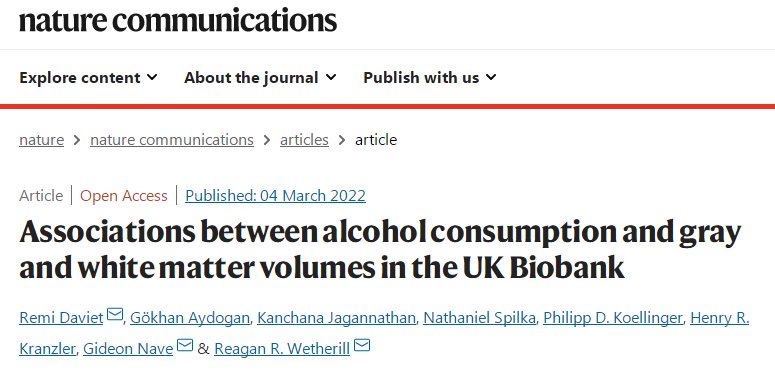Do you like to have two drinks when you have nothing to do?
Excessive consumption of alcohol is known to have serious effects on the body, including damage to the liver. But how much is an excess? For diseases such as liver cirrhosis, it is common to drink more than 210 grams of pure alcohol per week, which is equivalent to about two bottles of wine a week or about 230 ml of beer a day. The UK’s chief medical officer recommends that adults should drink no more than 140 grams of pure alcohol a week to reduce their risk.
However, the liver is not the only organ that can be damaged by drinking alcohol. The brain is also damaged. Drinking more than the UK’s current low-risk indicator is linked to an increased risk of dementia. A study published in Scientific Reports found that even moderate alcohol consumption can lead to a decrease in brain volume.

To understand the effects of drinking on the brain, researchers surveyed 300 people aged 39 to 45. Most of the participants indicated that their alcohol consumption was moderate or low risk (an average of less than 140 grams of pure alcohol per week). Even so, brain scans showed that their brain volumes were reduced compared to the average.
Although the study did not take into account the physiological effects of brain tissue loss, any significant loss of brain tissue results in suboptimal brain function. Although the adult brain gradually shrinks with age, early brain loss may accelerate brain shrinkage caused by other pathologies, such as high blood pressure and diabetes that can develop in middle or later life.
This is critical because we now know that quitting alcohol can partially reverse alcohol-induced brain damage. We can observe this phenomenon after the sixth week of complete abstinence, especially in the frontal lobe, the most frontal part of the brain that regulates behavior and thinking.

A study published in Nature Communications on March 4 may make you think twice . Because even small to moderate alcohol consumption can cause damage to the brain.

Researchers analyzed data on more than 36,000 adults and found an association between alcohol consumption and reduced brain size , even light-to-moderate drinking can cause damage to the brain.
Average drinking less than one unit of alcohol per day (about the equivalent of half a bottle of beer), brain volume begins to decrease. The decreased brain volume increased with each increase in alcohol consumption.
The researchers noted that the higher the alcohol consumption, the stronger the association. For example, in a 50-year-old, as average drinking increased from one to two alcohol units per day (a pint of beer or a glass of wine), the associated changes in the brain were equivalent to two years of aging; at the same age, the average Drinking alcohol from two alcohol units to three alcohol units is equivalent to 3 1/2 years of aging in the brain.
An earlier study found that smaller brain volume was associated with drinking 70 to 140 grams of pure alcohol per week. This level of drinking also leads to a decrease in the ability to remember words. When we study the effects of alcohol on the brain, we naturally focus on dementia, as well as studying changes in memory. After all, one of the diagnostic criteria for dementia is memory loss. But we now know that alcohol damage occurs in the frontal lobes of the brain earlier than those involved in memory. The frontal lobes control the flexibility of our personality, behavior, and thinking. These functions cannot be assessed by tests to diagnose dementia.
But what is considered reasonable and moderate drinking can slowly damage our brains. Given this, we should detect damage as early as possible. Fortunately, an eight-point test is now available to detect early cognitive impairment, commonly used by mental health service specialists to detect early brain damage caused by alcohol. Some hospitals or general clinics can also perform early frontal lobe function tests.

This finding is significant, revealing the extent to which alcohol can potentially damage our brains that normally would not perceived.
If we are to solve this problem, we need to change both our attitudes towards drinking and the way we provide health care. While changing drinking behaviors in older adults, it is also important to watch for early signs of brain damage in all drinkers.
In the context of public health and mental health policy, research on alcohol use among older adults has progressed. However, research to detect brain damage in drinkers has not progressed accordingly. Cutting back on alcohol intake or quitting alcohol altogether can reduce the risk of brain damage. But it also requires us to maintain a good lifestyle, including healthy eating habits and exercise.
Source: Popular Science China
